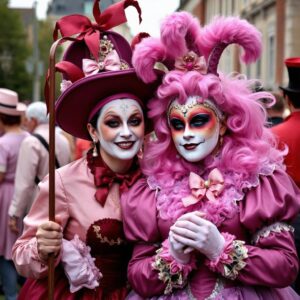Carnival in Germany: Traditions, History, and Regional Variations
Carnival in Germany, known as “Karneval” or “Fasching,” is a vibrant and joyous celebration that sweeps across the country every year. This lively festival is marked by colorful parades, elaborate costumes, and a spirit of merrymaking that brings communities together. From its historical roots to the unique regional differences, this article explores the rich traditions, culinary delights, and special features of the Carnival season in Germany.

Two individuals dressed in elaborate historical costumes partake in the festive Carnival celebrations in Germany.
A Glimpse into History
The origins of Carnival in Germany date back to pre-Christian times. People celebrated it as a pagan festival to ward off winter spirits and welcome the arrival of spring. With the spread of Christianity, these festivities integrated into the religious calendar. They became a pre-Lenten celebration, serving as a period of indulgence before the fasting and penance of Lent. The term “Karneval” comes from the Latin words “carne vale,” meaning “farewell to meat,” reflecting the tradition of feasting before Lent.
Traditions and Regional Differences
Carnival traditions in Germany vary widely across regions, each adding its unique flavor to the celebration. Here are some notable regional differences:
- Rhineland (Rheinland): Cities like Cologne (Köln), Düsseldorf, and Mainz are famous for grand and extravagant Carnival celebrations. The “Rosenmontag” (Rose Monday) parade is the highlight, featuring elaborate floats, marching bands, and participants in stunning costumes. The “Jecken” (revelers) take to the streets, singing, dancing, and throwing sweets to the crowd.
- Alemannic Fasnacht: In southern Germany and Switzerland, the Alemannic Fasnacht features ancient customs and wooden masks. Cities like Basel and Freiburg host parades where participants wear hand-carved masks and traditional costumes, often depicting historical or mythical figures.
- Bavaria (Bayern): In Bavaria, “Fasching” includes lively parades, masked balls, and the famous “Weiberfastnacht” (Women’s Carnival). Women take center stage, engaging in playful pranks and cutting men’s ties as a symbol of female empowerment.
- North Germany (Norddeutschland): Northern regions like Lower Saxony and Hamburg also partake in Carnival festivities, with local parades and community events.
German Carnival Holidays in 2025
Carnival season, known as the “Fifth Season,” officially begins on November 11th, 2024, at 11:11 AM and culminates in the main celebrations during the week leading up to Ash Wednesday in 2025. Key dates include:
- Weiberfastnacht (Women’s Carnival): Thursday, February 27, 2025
- Rosenmontag (Rose Monday): Monday, March 3, 2025
- Fastnacht (Shrove Tuesday): Tuesday, March 4, 2025
- Aschermittwoch (Ash Wednesday): Wednesday, March 5, 2025
Explore the vibrant traditions and rich history of Carnival in Germany. Discover the unique regional variations, from the grand parades in Cologne and Düsseldorf to the ancient customs of Alemannic Fasnacht. Learn about the key Carnival holidays, delicious culinary specialties like Berliner Pfannkuchen and Mutzenmandeln, and how communities across Germany celebrate this joyous festival. Dive into the heart of German culture during the festive season!
Culinary Specialties
No Carnival celebration is complete without indulging in delicious culinary specialties. During Carnival, bakeries and kitchens across Germany prepare a variety of traditional treats, including:
- Berliner Pfannkuchen: Also known as “Krapfen” or “Fasnachtsküchle,” these fluffy, yeast-based doughnuts are deep-fried to golden perfection and filled with sweet jams, creams, or chocolate.
- Mutzenmandeln: These small, almond-shaped pastries are fried and dusted with powdered sugar, offering a delightful crunch with every bite.
- Schmalzkuchen: Similar to doughnut holes, these bite-sized fried pastries are a Carnival favorite, often enjoyed fresh and warm.
Carnival in Germany
Carnival in Germany is a time of joy, unity, and cultural expression. From its historical roots to its diverse regional traditions, Carnival offers a unique glimpse into the heart of German culture. As revelers don their costumes and immerse themselves in the festivities, they celebrate not only the end of winter but also the vibrant spirit of their communities. Whether you’re in the Rhineland, Bavaria, or any other part of Germany, the Carnival season is a delightful experience filled with laughter, music, and delicious treats.

